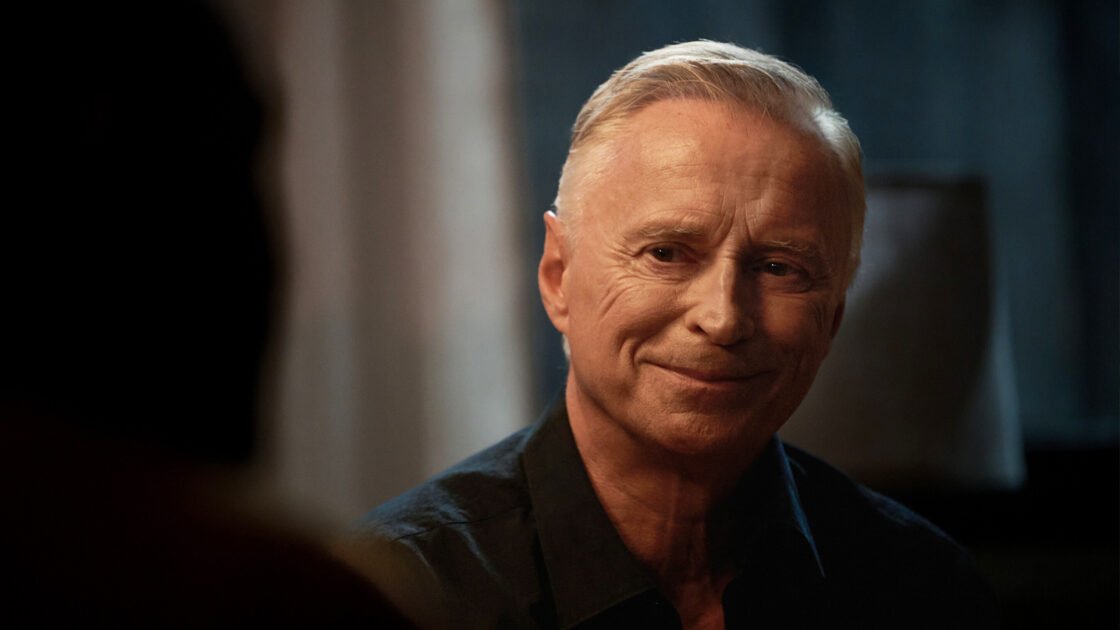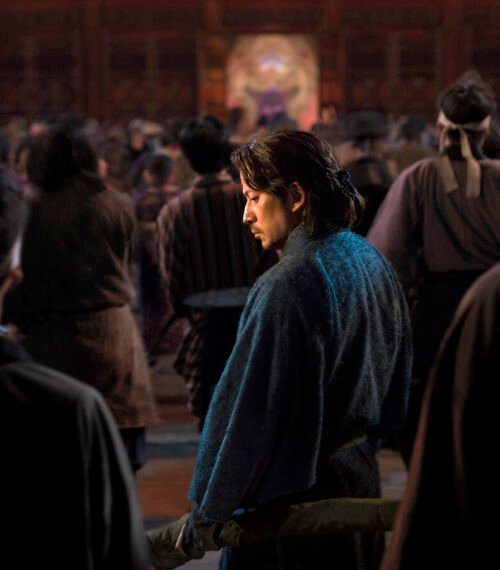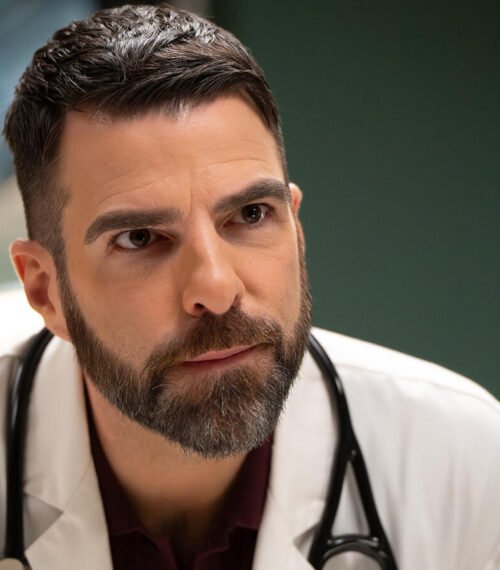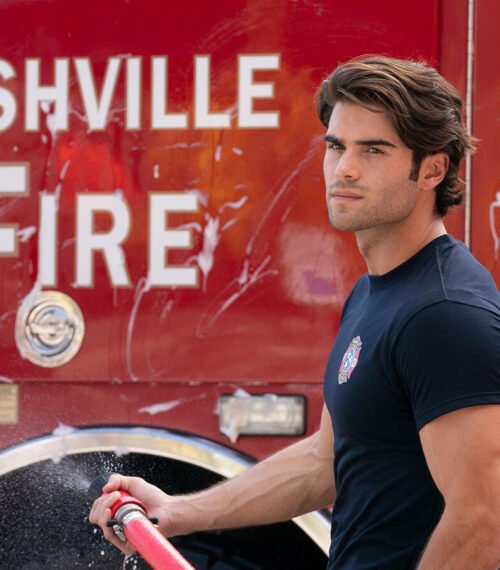[Warning: The following contains spoilers for Season 2, Episode 2 of Watson. Read at your own risk.]
The game is afoot, as the famous Sherlock Holmes loves to say. It is definitely the case for the enigmatic detective who has finally made his grand appearance on Watson. Sherlock’s (Robert Carlyle) arrival in Pittsburgh served as the Watson Season 2 premiere cliffhanger, but the sophomore episode gave us a chance to catch up with the sleuth and find out exactly what happened the day he and Moriarty (Randall Park) went over the waterfall.
It was a case of mistaken identity! Sherlock set up a trap for Moriarty (Randall Park) and John Stapleton, his two primary rivals, and it was the two of them in a tussle that John (Morris Chestnut) saw go over the waterfall. Sherlock hadn’t anticipated that John would figure out his ruse and show up, so after John went over the cliff to save who he thought was Sherlock, the actual Sherlock was the one to fish John out of the water.
That answers one question, but there are still multiple unanswered queries between the two best friends. Sherlock was less willing to divulge why he’s in Pittsburgh — it’s for more than storytime and making veiled innuendos at John — and what he has up his sleeve. We know he wants to solve “who stole the world,” and he wants to know he’s made a true impact before he dies. He’s definitely piqued John’s interest.
Everything you need for fall TV:
TV Guide caught up with Carlyle to discuss Sherlock’s big mission and how this version of the legendary detective is going to be something that fans haven’t seen before.
What was your approach to taking on a character who people are very familiar with and has been portrayed by so many actors before?
Robert Carlyle: When the scripts first came in, like you just said, I thought of all of these different people that have played it all these different sorts of ways. The guy that I remember first is Basil Rathbone. I guess he did it in the ’50s, on the TV in the U.K. Back then, he did the deer stalker and the pipe and cape. It was all very Victorian England. The more I thought about it, the more I thought about how different that was to what I am about to do. It was genuinely like a light bulb at the moment, you know? Forget about that. There’s no point in thinking about what it’s been like, who’s played it before, or what they’ve done. This is an entirely different thing.
There are different aspects of this Sherlock Holmes, which hopefully people haven’t seen before. One of the main things is Sherlock’s sense of his own mortality. He’s an older man. He’s aware that he’s going to die one day, and what’s going to be left behind? Is he going to have anything to leave behind?
He says in this episode that he has an endgame in mind, a new mission for his third act. What is your interpretation of what that mission is?
Carlyle: I genuinely don’t know what the end is going to hold. It’s not as if you start with 20 scripts. You’ve got a couple, and they come every couple of weeks. You generally get the script that you’re involved in, maybe five days before. This is just me surmising and putting together what we’ve done in the last few episodes, that Sherlock is really against the world. He doesn’t like the way the world has become. He asks Watson, “Who stole the world?” That’s what’s on his mind. What can he do to make things fairer and kinder in the world? That is his third act enterprise. Who knows what that is going to be? But I think it is going to be something epic.
What were your conversations like with Morris about how to make this friendship between Sherlock and John feel lived in?
Carlyle: That’s exactly what you hope you have. It’s very, very difficult to achieve because of the machine that is American TV. It’s so quick. Everything is so fast that you’ve got to get there very, very quickly. I didn’t meet Morris at all before I went on set. The first time I met him, we were on set together. You’re kind of hoping and praying… Morris is such a lovely guy. He’s a really wonderful, beautiful man. He was so welcoming, so kind, and so gentle with me, and encouraging with me. He made it really, really easy. I would say within two or three scenes, we kind of had this thing. People talk about this word, chemistry, and I kind of hate the word in a sense. I don’t know what it means, but it’s difficult to find another word that describes it. If you want to use that word, then yes, that’s what we have. I think that Morris and I have wonderful chemistry together. As the episodes have progressed, it’s just got closer and closer.
These are two men who have already risked their lives for each other. What is it about this specific Watson and Sherlock that creates that kind of loyalty?
Carlyle: It’s almost like Sherlock and Watson are looking at each other in a mirror. They see each other. There’s something quite distinct about that. Maybe what they are going through is what the other is going through and vice versa. That is something that is very strong. It may not be very apparent at first, but as the series progresses, it becomes obvious they’re sharing one mind.
Is Sherlock jealous or having FOMO that he’s not part of John’s team, solving mysteries?
Carlyle: No. It’s the pompous quality of Sherlock when he talks of the doctors. He asks, “What about the others? Are they worthy of the name on the door?” Which is a really great, nasty thing to say. Are they worth anything, these people? He probably thinks there’s something a bit strange about Ingrid. He sees her, obviously, as a nemesis for Watson. If anyone would know about a nemesis, it is Sherlock, because he has many of them. So he sees that in Ingrid. … We haven’t gotten to the end of these stories yet. We’ve got another 10 episodes to go, so hopefully I’ll have some fun with the other doctors.
Speaking of Sherlock’s nemesis, Moriarty is allegedly off the table. Who would you consider Sherlock’s nemesis at this point in time?
Carlyle: I think his nemesis at this moment is himself. There are too many dark thoughts in his mind about death and what his life has been worth, what it has all been about. I think that’s the thing that’s probably holding him back. That’s the thing that he’s banging on about at the moment.
ALSO READ: <em>Watson</em>’s Morris Chestnut teases Sherlock’s impending impact in Season 2
He’s also very invested in John and Mary. What is it about them that has Sherlock convinced they should be together?
Carlyle: It is probably the fact that Sherlock has never had anything like that in his own life. He sees that there’s a relationship where there’s love there. That’s not something you necessarily associate with him. He loves love, you know. He absolutely loves that. He sees that love and those two, and he wants those two together desperately. He feels guilty that they’re not. He’s a big part of the reason why they’re not, so he wants to try and make it right.
Is there anything you have on your Sherlock bucket list that you want to do with him before your tenure on the show is up?
Carlyle: It’s so politically incorrect nowadays, but the pipe would be good. There is something about Sherlock and the pipe, but I don’t know if we could do that.
Maybe they could get him a pipe-shaped vape?
Carlyle: I don’t know if he might be encouraging people to vape smoke pipes. That’s the only problem. I like the idea of sitting there with the pipe. That might be the thing. Maybe we’ll try to bring in a vape pipe.
Watson continues Mondays at 10/9c on CBS. Episodes are available the next day on Paramount+.















































































































